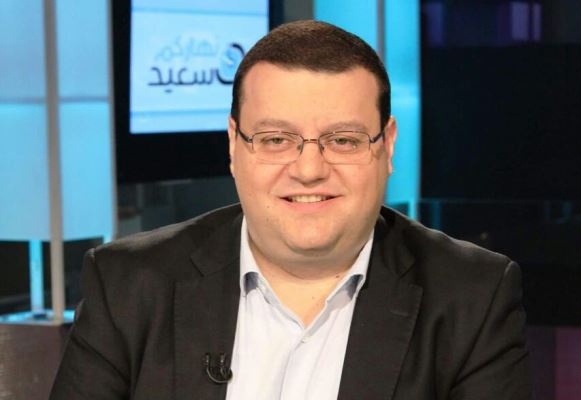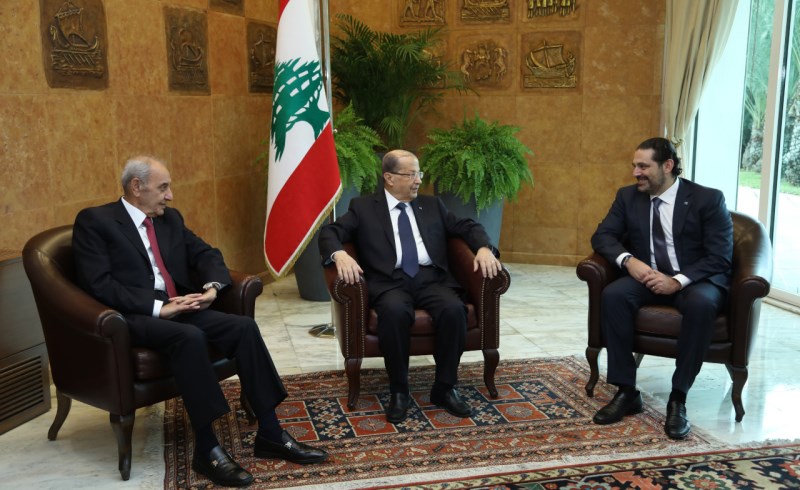Lebanon’s new political crisis: Now what?
Rami Rayess/ The Arab Weekly
8 يناير 2018

There is no chemistry between the two men. This is well-known in Lebanon. Lebanese President Michel Aoun and Speaker Nabih Berri have been at odds for decades. Rarely have their positions coincided. Their common ally, Hezbollah, has played the role of mediator several times, sometimes succeeding; failing in other circumstances.
Berri’s parliamentary bloc refrained from voting for Aoun in the presidential elections in October 2016. Almost all other parties voted, though reluctantly, for the president.
The common efforts that Aoun and Berri exerted after the abrupt resignation announcement of Prime Minister Saad Hariri last November was not sufficient to cement their differences. Though they reduced local tensions after the crisis and led international efforts to secure Hariri’s travel to Paris, their relationship returned to ground zero on the prime minister’s return to Beirut and the resumption of work in constitutional institutions.
A new crisis erupted after Aoun and Hariri signed a decree that gives Lebanese Army officers from 1994 financial and administrative rights. As Berri considered that the decree should be signed by the minister of finance because it entails financial obligations, Aoun refused to adopt a new custom that makes the signature of the finance minister mandatory.

Attempts to keep the cabinet neutral in this conflict led to a December 28 session, presided over by Aoun, putting the decree issue aside.
Most interesting was the silence of Hezbollah on the issue, bearing in mind the close ties of the party to both Aoun and Berri. No information has been leaked as to whether Hezbollah would mediate between the two leaders because any such mediation would be an immense embarrassment. It cannot refuse Berri’s objection requesting the signature of the Shia minister of finance on the decree and it is simultaneously keen to preserve the alliance relationship it has with the president.
In Lebanon, there is no constitutional body that has the prerogative of explaining the articles of the constitution when there are contradictory views on a certain article. This issue had recurred on several occasions. It has become a popular statement in Lebanon that the constitution is more of a viewpoint.
A constitutional council was established in 1991 after the Taif Agreement. It was given the prerogative of investigating the claims of losers in elections, whether parliamentary or presidential, in addition to claims by leaders of spiritual authorities regarding personal status laws.
Authority of explaining controversial constitutional articles has not been granted to the council, probably to keep the vagueness in the service of politicians. This makes the constitution flexible to meet the aspirations of the contending parties in the country.
If this political crisis is not resolved soon, Aoun might have a hard time running affairs smoothly. The political weight of Speaker Berri, supported by the leader of the Progressive Socialist Party, Walid Jumblatt, needs to be taken into consideration, especially that Hariri stands in the middle, though he signed the decree.
Lebanon’s internal political balance has always been a delicate issue. Every time it was upset for a reason or another, the country lived political stagnation and in some cases violence. This is not necessarily the case now. However, this needs to be taken into consideration.
 عن أمل جنبلاط المتجدد: لبنان يستحق النضال
عن أمل جنبلاط المتجدد: لبنان يستحق النضال
 صحافيون أم عرّافون!
صحافيون أم عرّافون!
 ماذا يجري داخل أروقة بيت الكتائب المركزي؟
ماذا يجري داخل أروقة بيت الكتائب المركزي؟


 عن الخرائط التي تُرسم والإتفاقات التي تتساقط!
عن الخرائط التي تُرسم والإتفاقات التي تتساقط!
 “الإنحراف في الحياة”/ بقلم كمال جنبلاط
“الإنحراف في الحياة”/ بقلم كمال جنبلاط
 هاشتاغ #صار_الوقت يحل أولاً في حلقة جنبلاط
هاشتاغ #صار_الوقت يحل أولاً في حلقة جنبلاط
 طاولة نقاش عن أزمة الصحافة في جامعة AUST
طاولة نقاش عن أزمة الصحافة في جامعة AUST
 عبدالله: ليظهر لنا وزير مكافحة الفساد حرصه في صفقات البواخر والفيول
عبدالله: ليظهر لنا وزير مكافحة الفساد حرصه في صفقات البواخر والفيول
 عبدالله: غريب أمر وزارة مكافحة الفساد!
عبدالله: غريب أمر وزارة مكافحة الفساد!

 Comment to Uri Avnery: How Sad What Is Looming Ahead
Comment to Uri Avnery: How Sad What Is Looming Ahead
 “Not Enough!”
“Not Enough!”
 … لمن لم يقرأ يوسف البعيني/ بقلم وسام شيّا
… لمن لم يقرأ يوسف البعيني/ بقلم وسام شيّا
 كمال جنبلاط في مولده الأول بعد المائة: تعاليمه وأفكاره ما زالت الحلّ/بقلم عزيز المتني
كمال جنبلاط في مولده الأول بعد المائة: تعاليمه وأفكاره ما زالت الحلّ/بقلم عزيز المتني
 رئيس حزب/ وليس (… سابقاً)/ بقلم د. خليل احمد خليل
رئيس حزب/ وليس (… سابقاً)/ بقلم د. خليل احمد خليل
 التوازن السياسي في لبنان
التوازن السياسي في لبنان
 لبنان… مشاريع انقلابية مؤجلة
لبنان… مشاريع انقلابية مؤجلة
 جنبلاط وحَمَلة أختام الكاوتشوك
جنبلاط وحَمَلة أختام الكاوتشوك
 Le Liban est un symbole de tolérance
Le Liban est un symbole de tolérance
 Our Automated Future
Our Automated Future
 The True Origins of ISIS
The True Origins of ISIS
 Les Misérables vs. Macron
Les Misérables vs. Macron
 عذراً أيها المعلم/ بقلم مهج شعبان
عذراً أيها المعلم/ بقلم مهج شعبان
 رساله الى المعلم / بقلم ابو عاصم
رساله الى المعلم / بقلم ابو عاصم
 إلى روح القائد والمعلم كمال جنبلاط/ بقلم أنور الدبيسي
إلى روح القائد والمعلم كمال جنبلاط/ بقلم أنور الدبيسي
 أسرار وعناوين الصحف ليوم الجمعة 14 كانون الاول 2018
أسرار وعناوين الصحف ليوم الجمعة 14 كانون الاول 2018














